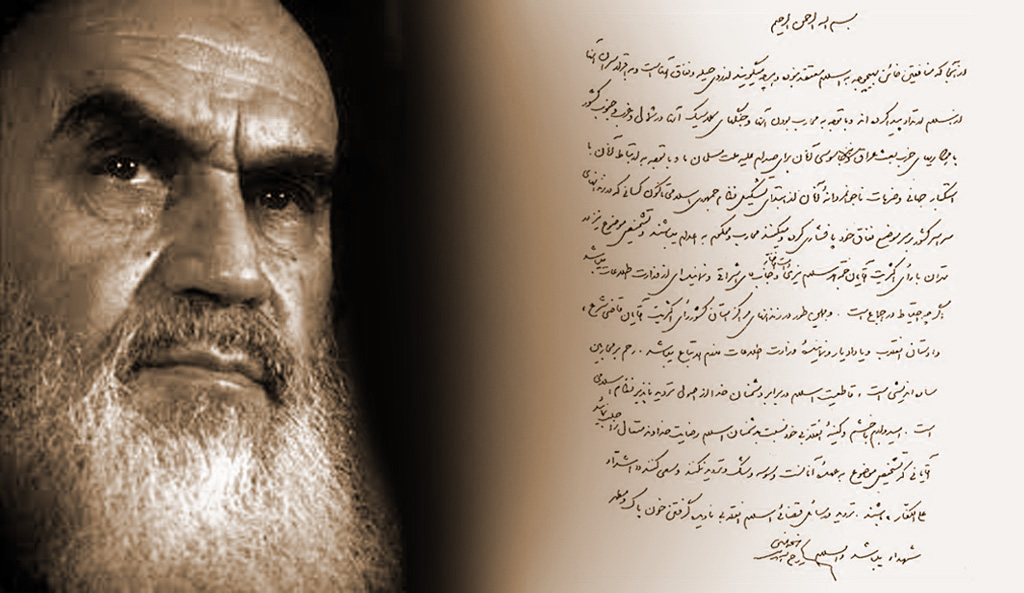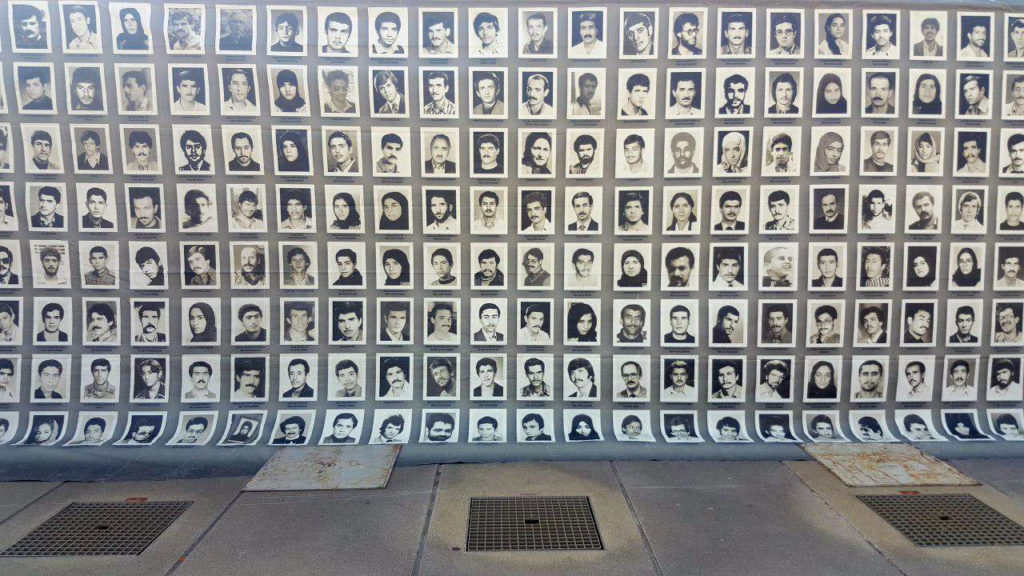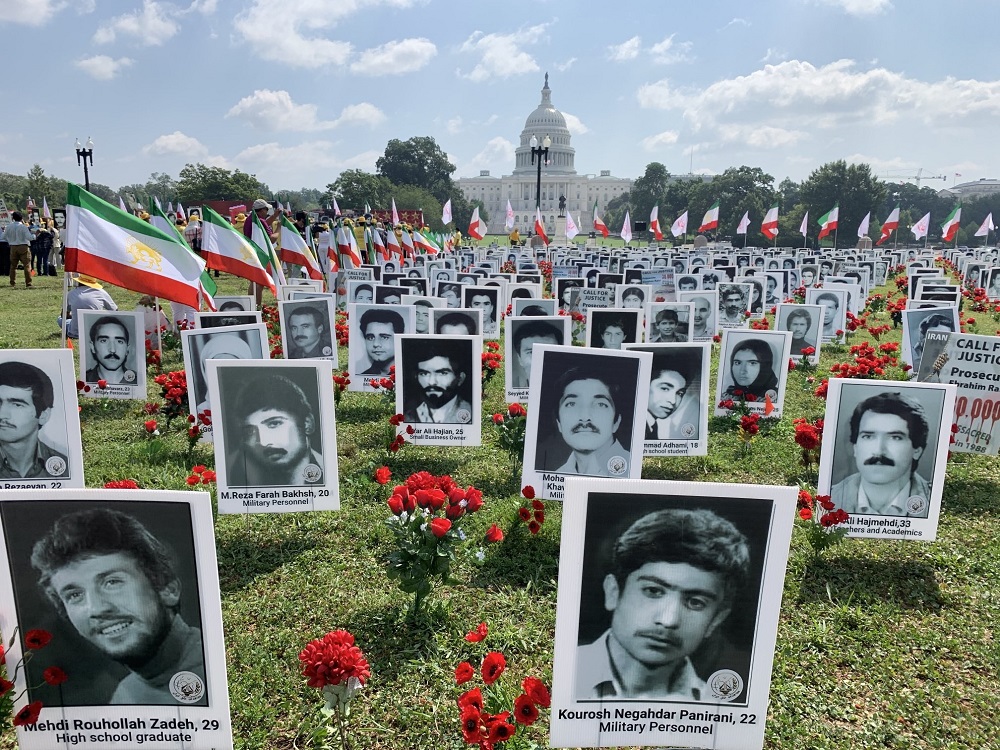By Hanif Jazayeri
Thirty-three years ago, on the orders of Ayatollah Khomeini, Iran carried out a systematic slaughter of thousands of political prisoners who refused to renounce their beliefs in what became known as the 1988 massacre. For over three decades, families of the victims have faced imprisonment and torture for seeking justice. While key perpetrators of those mass atrocities have now risen to positions of power, the world is, belatedly, only just starting to wake up to the crisis of impunity that exists in Iran.
The 1988 massacre
In July 1988, at the end of the Iran-Iraq War, Iran’s then-Supreme Leader Ayatollah Ruhollah Khomeini issued a fatwa, or religious decree, ordering the execution of imprisoned opponents who had already been tried and were serving their prison terms. Thus began what turned out to be the biggest massacre of political prisoners in recent history. It is estimated that some 30,000 inmates were extra-judicially executed or forcibly disappeared within several months.

Khomeini’s fatwa targeted political prisoners affiliated to the main opposition group People’s Mojahedin Organization of Iran (PMOI or MEK) who remained loyal to the organization. The fatwa stated: “As the [PMOI] do not believe in Islam … and as they are waging war on God … It is decreed that those who are in prison throughout the country and remain steadfast in their support for the [PMOI] are waging war on God and are condemned to execution.”
‘Death Commissions’ were formed across Iran sending thousands of prisoners who refused to abandon their beliefs to execution. The victims were buried in secret mass graves across the country.
Eminent human rights experts have stated that the extrajudicial executions of 1988 amount to crimes against humanity and genocide. Former UN judge Geoffrey Robertson has described the killings as genocide, arguing that according to Khomeini’s decree, the principal reason for the call to annihilate PMOI supporters was that they were “waging war on God.” According to renowned international humanitarian law expert Prof. Eric David, what happened in 1988 “amounts to genocide.”
A culture of impunity
Iranian society is today at serious risk of further mass atrocities, with top perpetrators of the 1988 massacre being appointed to the head of both the Executive and Judiciary branches in 2021. Iran’s current President Ebrahim Raisi was in 1988 Deputy Tehran Prosecutor and a member of the ‘Tehran Death Commission’ that sent thousands of political prisoners to death, while Iran’s new Judiciary Chief Gholam-Hossein Mohseni-Ejei supervised the mass executions of 1988 as the Judiciary’s representative in the Intelligence Ministry.
The failure of the international community to hold the perpetrators of the 1988 massacre accountable has emboldened the Iranian authorities to commit further atrocities against dissident protesters and political prisoners, as was witnessed during the deadly crackdown on the nationwide protests of 2019.
Meanwhile, families of the victims, survivors, and human rights defenders are today the subject of persistent threats, harassment, intimidation, and attacks because of their attempts to seek information on the fate and whereabouts of the victims and their demands for justice. Simultaneously, the authorities are systematically destroying the mass graves in an attempt to wipe the evidence of their crimes.

The families seek justice
In 2016, at the request of the families, a group of human rights lawyers formed ‘Justice for the Victims of the 1988 Massacre in Iran’ (JVMI) in London to help the campaign for accountability, truth, and justice.
Based on interviews with dozens of survivors and hundreds of families, JVMI has identified nearly 100 members of the 1988 Death Commissions in two published reports. It has also identified 59 mass graves where victims are believed to be buried. JVMI has presented its findings to the Office of the UN High Commissioner for Human Rights (OHCHR) and the UN Special Rapporteur on the situation of human rights in the Islamic Republic of Iran.
Time for a UN inquiry
In a major breakthrough, seven UN Special Rapporteurs wrote to the Iranian authorities on 3 September 2020, pointing out that the 1988 extrajudicial executions may amount to “crimes against humanity.”
The seven experts stated that the failure of UN bodies to act over the 1988 massacre has “had a devastating impact on the survivors and families” and “emboldened” the Iranian authorities to “conceal the fate of the victims and to maintain a strategy of deflection and denial.”
They suggested that the international community should “investigate the cases including through the establishment of an international investigation.”
With Iran failing to respond to the Special Rapporteurs, some 152 former UN officials and renowned international human rights and legal experts wrote to UN High Commissioner Michelle Bachelet on 3 May 2021, calling for the formation of a Commission of Inquiry into the 1988 massacre.
In addition to JVMI, the letter’s signatories included a former UN High Commissioner for Human Rights, a former UN Deputy Secretary-General, 28 former UN Special Rapporteurs on human rights, and the chairs of previous UN Commissions of Inquiry into human rights abuses in Eritrea and North Korea. Distinguished legal professionals who signed the appeal included the former Chief Prosecutor of the International Criminal Tribunals for the former Yugoslavia and Rwanda, a former Special Prosecutor at the Special Tribunal for Lebanon, and the first President of the UN Special Court for Sierra Leone.
Furthermore, Amnesty International in a statement on 19 June 2021 reiterated that Ebrahim Raisi had a key role in the 1988 massacre and should be “investigated for his involvement in past and ongoing crimes under international law, including by states that exercise universal jurisdiction.”
In its report, Blood-soaked secrets: Why Iran’s 1988 prison massacres are ongoing crimes against humanity, published in 2018, Amnesty International concluded that, in addition to committing the crime against humanity of murder in 1988, by extrajudicially executing thousands of political dissidents in secret, the Iranian authorities are committing the ongoing crimes against humanity of enforced disappearance, persecution, torture and other inhumane acts, including by systematically concealing the fate of the victims and the whereabouts of their remains.
UN Special Rapporteur on Iran, Javaid Rehman, in an interview with Reuters on 29 July 2021 called for an independent inquiry into the 1988 state-ordered executions and the role played by Ebrahim Raisi as Tehran Deputy Prosecutor. Prof. Rehman said that his office was ready to share gathered testimonies and evidence if the UN Human Rights Council or another body sets up an impartial investigation. He expressed concern at reports that some “mass graves” were being destroyed as part of a continuing cover-up.
Separately, in a report to the Human Rights Council, the UN Working Group on Enforced Disappearances (WGEID) called for an “international investigation” into the 1988 massacre. The report, dated 4 August 2021, stated: “The Working Group reiterates the concerns expressed about the ongoing concealment of burial sites of those forcibly disappeared and allegedly executed between July and September 1988 across the country. The Working Group recalls that an enforced disappearance continues until the fate and whereabouts of the individuals concerned are established and joins the call for an international investigation into the matter.”

In light of the concerns raised by the UN Special Procedures, some UN Member States are now also beginning to focus on the need for accountability and justice over the 1988 massacre.
In Sweden, a low-ranking perpetrator of the 1988 massacre, Hamid Noury, is currently in custody and on trial for his role as Assistant to the Deputy Prosecutor of Gohardasht Prison during the mass murders.
Furthermore, at the UN General Assembly Third Committee last week, Canada’s representative decried attempts by Iranian authorities to destroy evidence of the 1988 massacre, stating: “Families must be able to exercise their rights to remedy and to reparation. They deserve to know the truth.”
Similarly, the UK has urged Iran to allow the UN Special Rapporteur access to the country to “conduct research and investigations into human rights concerns reported there, including the events of 1988, and the reports of intimidation and destroyed evidence.”
The US State Department in a tweet marking the International Day of the Victims of Enforced Disappearances in August called on Iran to release political prisoner Maryam Akbari Monfared who has been held in Iranian prisons for 12 years for protesting the deaths of her family members in the 1988 massacres.
Meanwhile, Belgium’s Foreign Minister urged Iran in September to reveal the truth about the enforced disappearances and extrajudicial killings of 1988. And the Prime Minister of Slovenia, whose country currently holds the EU’s rotating presidency, publicly supported an international Commission of Inquiry into the 1988 massacre in a speech last July.
While such public positions by world leaders are a welcome development, a UN investigation into the 1988 massacre is long overdue.
It’s high time the Human Rights Council once and for all challenges the impunity enjoyed by Iranian officials by adopting a resolution for an international investigation into the 1988 mass extra-judicial executions and enforced disappearances of thousands of political prisoners. It’s time for Iranian officials to be held to account. Accountability is vital for bringing closure to the families and for preventing similar mass atrocities by Iranian officials in response to ongoing protests by Iran’s people for political change.
Hanif Jazayeri is Secretary of London-based NGO Justice for the Victims of the 1988 Massacre in Iran (JVMI) and a news editor. His Twitter handle is @HanifJazayeri.